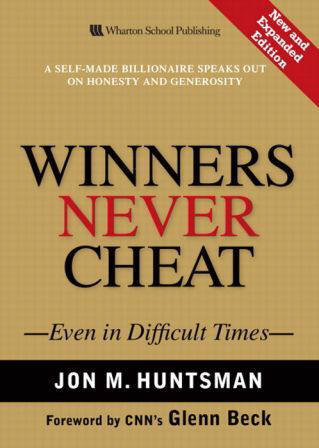It is no secret to anyone that our country has struggled through a very difficult economy the past few years. As a result, we have seen many companies change their strategies to include shortcuts and other questionable business practices. In his book, Winners Never Cheat, Jon Huntsman points out the role that character and integrity have played in building his own business empire and how that has fueled his desire to give to others. There are several biblical principles mentioned throughout the book even though the book isn’t overtly Christian in its worldview.
Here are some thoughts I highlighted while reading…
- In today’s world where too many people try to grab and hoard as many dollars as they can, where politicians do anything to cling to power, where we mistakenly believe that business can no longer be done with a look in the eye and a handshake, it is time that we remember the values of honesty, integrity, and generosity.
- Circumstances may change but your values shouldn’t.
- “happiness is not the absence of conflict, but the ability to cope with it.”
- Shakespeare’s immortal words: “Sweet are the uses of adversity.”
- The confusion, frustration, stress, and fears that come with financial dilemmas can make even the most ethical of individuals vulnerable to bad choices.
- When facing severe challenges, your mind normally is at its sharpest. Humans seldom have created anything of lasting value unless they were tired or hurting.
- The adherence to an ethical code is best defined as how one honors a bad situation or a bad deal.
- And how one honors situations when things turn sour or when a deal ends up being more costly than originally thought is how one defines his or her personal values.
- There cannot be separate sets of ethics for home, for work, for church, and for play. Ethics belong in the home and the boardroom.
- Tough times must not be allowed to vanquish us.
- Gray is not a substitute for black and white.
- Forget about who finishes first and who finishes last. Decent, honorable people finish races—and their lives—in grand style and with respect.
- Compete fiercely and fairly—but no cutting in line.
- Character is most determined by integrity and courage. Your reputation is how others perceive you. Character is how you act when no one is watching.
- It’s okay to negotiate tough business deals, but do it with both hands on the table and sleeves rolled up.
- Children observe their elders so they know how to act. Employees watch supervisors. Citizens eye political leaders. If these leaders and role models set bad examples, those following frequently follow suit. It’s that simple.
- Leaders are called on to enter arenas where success isn’t covered by the warranty, where public failure is a real possibility.
- “Good judgment comes from experience, and experience comes from poor judgment.”
- “Difficulty is the one excuse that history never accepts.”
- A crisis allows us the opportunity to dip deep into the reservoirs of our very being, to rise to levels of confidence, strength, and resolve that otherwise we didn’t think we possessed.
- Leadership is a privilege. Those who receive the mantle must also know they can expect an accounting of their stewardships.
- As captains of our own character, it is essential we understand the great legacy of trust and integrity. We will be remembered for truthful disclosures and promises kept.
- Justice has a way of catching up to those who do injury to others. It happens most often without our assistance.
- I know of no truly successful person who does not demonstrate a sense of decency.
- “Accumulation of wealth for the sake of wealth alone is self-defeating. Only in seeing one’s work as a calling, a means to serve a higher purpose, can we find true fulfillment.”
- Fear is bondage.



